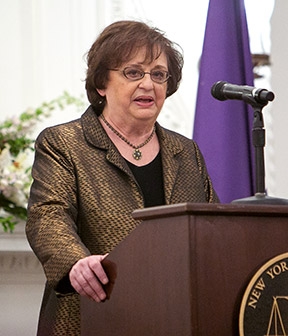New York Solicitor General Barbara Underwood honored by <i>Annual Survey of American Law</i>
At a ceremony in March, the student editors of the New York University Annual Survey of American Law dedicated the journal’s 77th volume to Barbara Underwood, New York’s solicitor general, in honor of her long public service career spent in the pursuit of justice.
The legal figures paying tribute to Underwood included Zachary Carter ’75, former US attorney for the Eastern District of New York (EDNY); Elizabeth Holtzman, former member of the US House of Representatives; Professor Pamela Karlan of Stanford Law School; Janet Sabel ’84, attorney-in-chief and chief executive officer of the Legal Aid Society; and Seth Waxman, former US solicitor general. The speakers had each met Underwood at different point in her multifaceted career, which has encompassed teaching at NYU Law, Yale Law School, and Brooklyn Law School as well as positions in the district attorney’s office in Manhattan, Brooklyn, and Queens. When New York Attorney General Eric Schneiderman resigned abruptly in 2018, Underwood became the state’s acting attorney general (and the first female one). At the federal level, Underwood has served as principal deputy solicitor general and acting solicitor general—the first woman to fill the US solicitor general role. She also has been both chief assistant US attorney and counsel to the US attorney in the Eastern District of New York (EDNY).
Carter, who worked with Underwood when he was US attorney in the EDNY, described her as a generous mentor. “When Barbara meets with her attorneys to discuss the difficult legal challenges presented by one or another pending case, Barbara, almost always the smartest lawyer in the room, often prefaces a question with, ‘I know this may seem like a stupid question, but…,’” Carter explained. “Now it never really is a stupid question, but this humble gesture creates a safe space for each of the attorneys in her charge to ask the questions they may have been too embarrassed to raise, and quite probably were on everybody’s minds anyway.”
Holtzman’s remarks were delivered on her behalf by Sander Saba ’20, editor-in-chief of the Annual Survey, since Holtzman could not attend. When Holtzman was Brooklyn’s district attorney, Underwood had worked for her. Holtzman praised Underwood’s determination in addressing two critical problems: racially based peremptory challenges in jury selection, and the failure of New York and other states to criminalize marital rape. “Despite her intellectual brilliance and her enormous grasp of the law,” Holtzman recalled, “she was always approachable and willing to share advice.”
Watch the entire event on video:
As one of Underwood’s students at Yale Law School, Karlan saw Underwood as a role model. When Underwood went to work for Holtzman in the Brooklyn DA’s office, Karlan spent a law school summer there. When Karlan notified Underwood of a sentencing error in a felony conviction, Underwood immediately pursued a confession of error in the case. “What impressed me most about this was that Barbara never questioned that it was our obligation to protect the defendant’s interests,” said Karlan. “She was the embodiment of the precept that the government wins whenever justice is done its citizens in the courts.”
Sabel, a colleague of Underwood in the New York attorney general’s office, recalled Underwood’s swift transition from solicitor general to acting attorney general the same day that Schneiderman resigned from the state’s top law enforcement position: “Barbara recognized that her eight months as AG until the next statewide election created a truly unique opportunity to serve the people of the state of New York with no political ambition.” During Underwood’s brief tenure, she oversaw a record-setting $174 million settlement with Charter Communications for delivering slower internet connections than promised; won an order from the US District Court for the Southern District of New York directing the US Environmental Protection Agency to comply with the Clean Air Act’s requirement regarding smog pollution from upwind states; and compelled the Donald J. Trump Foundation to dissolve in the course of a lawsuit alleging numerous violations of state and federal law. Last year, having returned to her state solicitor general role, Underwood argued before the US Supreme Court in Department of Commerce v. New York; the justices’ ruling prevented the Trump administration from adding a citizenship question to the 2020 census.
Waxman, who had been both Underwood’s student at Yale and later her boss when he was US solicitor general, praised Underwood’s oral argument style. When a Supreme Court justice asked her a question, he said, “Barbara would pause, which is a reckless strategy in a Supreme Court in which any moment of silence prompts another question.… But the effect of it was that when Barbara explained something, it just seemed original, it didn’t seem like it was a practiced answer that she had anticipated and had a glib response to.”
Speaking last, Underwood expressed gratitude for the preceding encomiums before turning to the continuing fight for equality and justice. “When political leaders encourage disrespect for courts and for the law, we’re all inclined to feel a pang of despair,” she said, “but especially those of us who are lawyers, who think of the law as a tool for justice…. Our work has never been more important. We’re fighting for justice now when we can get it, and we’re also laying down a marker for a brighter future. So when people ask, as they increasingly do, ‘Do you ever despair?’ my answer is, ‘No, we don’t have time for that.’”
Posted June 10, 2020


